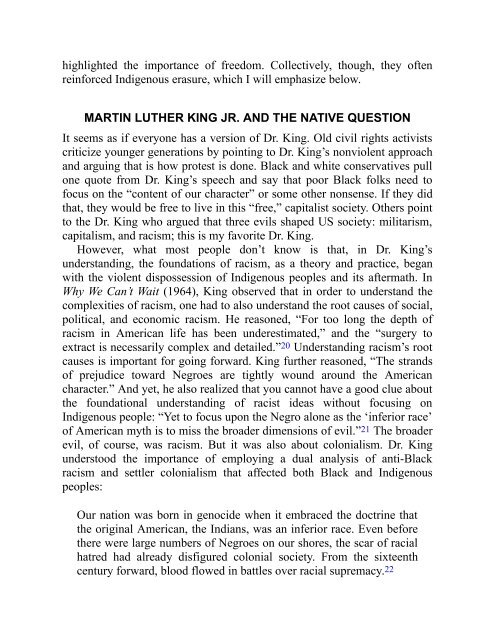You also want an ePaper? Increase the reach of your titles
YUMPU automatically turns print PDFs into web optimized ePapers that Google loves.
highlighted <strong>the</strong> importance <strong>of</strong> freedom. Collectively, though, <strong>the</strong>y <strong>of</strong>ten<br />
reinforced <strong>Indigenous</strong> erasure, which I will emphasize below.<br />
MARTIN LUTHER KING JR. AND THE NATIVE QUESTION<br />
It seems as if everyone has a version <strong>of</strong> Dr. King. Old civil rights activists<br />
criticize younger generations by pointing to Dr. King’s nonviolent approach<br />
and arguing that is how protest is done. Black and white conservatives pull<br />
one quote from Dr. King’s speech and say that poor Black folks need to<br />
focus on <strong>the</strong> “content <strong>of</strong> our character” or some o<strong>the</strong>r nonsense. If <strong>the</strong>y did<br />
that, <strong>the</strong>y would be free to live in this “free,” capitalist society. O<strong>the</strong>rs point<br />
to <strong>the</strong> Dr. King who argued that three evils shaped US society: militarism,<br />
capitalism, and racism; this is my favorite Dr. King.<br />
However, what most people don’t know is that, in Dr. King’s<br />
understanding, <strong>the</strong> foundations <strong>of</strong> racism, as a <strong>the</strong>ory and practice, began<br />
with <strong>the</strong> violent dispossession <strong>of</strong> <strong>Indigenous</strong> peoples and its aftermath. In<br />
Why We Can’t Wait (1964), King observed that in order to understand <strong>the</strong><br />
complexities <strong>of</strong> racism, one had to also understand <strong>the</strong> root causes <strong>of</strong> social,<br />
political, and economic racism. He reasoned, “For too long <strong>the</strong> depth <strong>of</strong><br />
racism in American life has been underestimated,” and <strong>the</strong> “surgery to<br />
extract is necessarily complex and detailed.” 20 Understanding racism’s root<br />
causes is important for going forward. King fur<strong>the</strong>r reasoned, “The strands<br />
<strong>of</strong> prejudice toward Negroes are tightly wound around <strong>the</strong> American<br />
character.” <strong>An</strong>d yet, he also realized that you cannot have a good clue about<br />
<strong>the</strong> foundational understanding <strong>of</strong> racist ideas without focusing on<br />
<strong>Indigenous</strong> people: “Yet to focus upon <strong>the</strong> Negro alone as <strong>the</strong> ‘inferior race’<br />
<strong>of</strong> American myth is to miss <strong>the</strong> broader dimensions <strong>of</strong> evil.” 21 The broader<br />
evil, <strong>of</strong> course, was racism. But it was also about colonialism. Dr. King<br />
understood <strong>the</strong> importance <strong>of</strong> employing a dual analysis <strong>of</strong> anti-Black<br />
racism and settler colonialism that affected both Black and <strong>Indigenous</strong><br />
peoples:<br />
Our nation was born in genocide when it embraced <strong>the</strong> doctrine that<br />
<strong>the</strong> original American, <strong>the</strong> Indians, was an inferior race. Even before<br />
<strong>the</strong>re were large numbers <strong>of</strong> Negroes on our shores, <strong>the</strong> scar <strong>of</strong> racial<br />
hatred had already disfigured colonial society. From <strong>the</strong> sixteenth<br />
century forward, blood flowed in battles over racial supremacy. 22


















